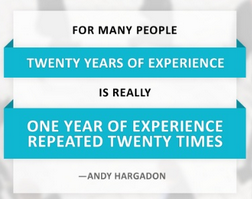 Steve Hoffarth has a good editorial piece in the August/September 2014 edition of Inside Motorcycles that got me thinking about scripted experience. Steve was lamenting his inability to go racing this year. He compared going on rides at a theme park and found them lacking. A scripted experience like being a passive rider on a roller coaster has nothing on the complex, non-linear and entirely participatory experience of racing.
Steve Hoffarth has a good editorial piece in the August/September 2014 edition of Inside Motorcycles that got me thinking about scripted experience. Steve was lamenting his inability to go racing this year. He compared going on rides at a theme park and found them lacking. A scripted experience like being a passive rider on a roller coaster has nothing on the complex, non-linear and entirely participatory experience of racing.I was sitting in the garage last night working on the Concours when my wife stuck her head in the door and asked how I was doing. "I'm in my happy place," I replied.
What made it happy was that I was fixing a problem that had no instruction manual. Success wasn't guaranteed and I had to approach it from several different angles before I could finally come up with a solution. Real satisfaction followed a resolution to a situation that could easily have ended in failure. It was an entirely unscripted situation, the kind I long for after your typically scripted day in the life of a 21st Century human.
So much of our lives are scripted nowadays, from phones telling us when to be where to GPS units telling us how to get there. Brakes script themselves for us because we can't be bothered to learn how to use them effectively, traction control leaps in at a moment's notice to script your acceleration, vehicles will park themselves, warn you when something is behind you because you couldn't be bothered to turn your head, and even avoid obstacles you couldn't be bothered to pay attention to. I used to enjoy driving, now, at its best, it feels more like sitting on a roller coaster.
All this scripting is a result of software. It may sound funny coming from a computer technology teacher, but that software kills it for me. If I wanted to watch machines race I wouldn't put people in the cars at all, it's safer that way. It's been a long time since a driver could take a car by the scruff of its neck and drag it around a circuit. We do all this in the name of safety, but ultimately I think it's lowest common denominator thinking; software engineers design life for the least capable people, they can sell more of it that way.
There are places in mechanics where it just makes sense to incorporate computer control, especially when it amplifies an operator's nuanced control of a vehicle rather than overwriting it. Thank goodness for fuel injection. It allows us to create responsive, linear fuelling and use less of a diminishing resource, it's all good, as are disc brakes and other technological advances that improve rider feel. I'm certainly not anti-technology, I make my living teaching it, but I am anti-technology when it takes over human inputs instead of improving them. That kind of thinking breeds sheeple.
 |
| Traction control (many settings!), antilock brakes (many settings!), hill start control and more electronics than a moon shot - perhaps bikes aren't the last bastion after all. |
Except they increasingly are. After I started riding last year I was astonished that this is legal. In a granny state-world where safety is all that matters, where SUVs are considered better because they're bigger and collision avoidance systems are desirable because you shouldn't have to pay attention while operating a vehicle, motorcycles too are succumbing to our vapid, software scripted lives.



















